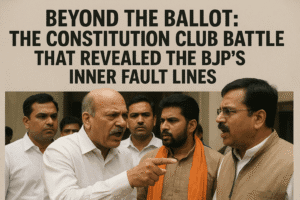Beyond the Ballot: The Constitution Club Battle That Revealed the BJP’s Inner Fault Lines
The fiercely contested election for Secretary (Administration) at Delhi’s Constitution Club transcended a simple administrative race, revealing deep fault lines within India’s ruling BJP. Incumbent Rajiv Pratap Rudy, representing establishment polish and cross-party networks, narrowly defeated challenger Sanjeev Balyan, who embodied grassroots mobilization and tapped into discontent. This unexpected intra-party battle saw open factionalism, with Balyan backed by key BJP ministers and allies while Rudy leveraged Opposition support.
Caste dynamics played a visible role, sharpening the contest. Rudy’s victory reaffirmed his entrenched influence and modernization record, but the scale of Balyan’s challenge exposed significant internal BJP tensions and signaled that long-held positions are now vulnerable. The high-stakes campaign transformed the usually sedate club into a political proving ground, demonstrating how even institutional roles have become critical arenas for power negotiation within the party.

Beyond the Ballot: The Constitution Club Battle That Revealed the BJP’s Inner Fault Lines
The polished wood and hushed corridors of Delhi’s Constitution Club rarely witness political fireworks. But on August 12th, 2025, this exclusive enclave for India’s lawmakers became the unlikely arena for a high-stakes, bare-knuckled political brawl – one fought entirely within the ruling BJP.
The prize? The seemingly administrative post of Secretary (Administration). The contenders? Two prominent BJP stalwarts: the urbane, long-entrenched incumbent, Rajiv Pratap Rudy, and the gritty, challenger Sanjeev Balyan. Rudy’s eventual victory – securing 354 in-person votes and 38 postal ballots, with a margin reported between 64 and 100 votes – was more than just retaining a club position. It was a microcosm of the BJP’s internal dynamics, caste calculations, and the simmering tensions beneath its disciplined facade.
From Gentlemen’s Club to Political Battleground:
Founded in 1947 and formally inaugurated in 1965, the Constitution Club serves as a social hub and networking ground for MPs, past and present. Under Rajiv Pratap Rudy’s 25-year stewardship, it transformed from a fading relic into a luxurious Lutyens’ Delhi destination, boasting spas, pools, and modern event spaces. Rudy, a six-time MP and former Union Minister, leveraged his extensive cross-party connections and reputation as a capable administrator to maintain his grip.
Sanjeev Balyan, a former MP from Muzaffarnagar and ex-Minister of State, represented a different energy. Campaigning on restoring the club’s “lost glory” and accusing Rudy of excessive commercialization, Balyan embodied a grassroots, disruptive force. His strength lay in his deep roots within the Jat community and a perception among some that Rudy’s long reign needed challenging.
The Campaign: Lobbying, Castes, and Late-Night Calls:
What unfolded was unprecedented for the Club:
- Factional Warfare: This wasn’t BJP vs Opposition; it was BJP vs BJP. Balyan drew open support from colleagues like Nishikant Dubey and reportedly from key BJP ministers and allies (Shiv Sena, TDP). Rudy, intriguingly, relied on his personal network, including several Opposition MPs, showcasing his unique cross-aisle leverage.
- Caste Calculus: Community loyalties surfaced openly. Rudy consolidated Rajput support, while Balyan mobilized the Jat vote and rural MPs. The election became a visible display of how caste identities permeate even institutional votes.
- Mobilization Marathon: Former MPs were flown in from across India. Intense lobbying, late-night calls, and strategic coalition-building marked the run-up, mirroring a high-level political campaign. Voter turnout (707 out of 1295 eligible) was remarkably high, drawing heavyweights like Amit Shah, JP Nadda, Sonia Gandhi, and Mallikarjun Kharge.
- The “Anti-Rudy” Sentiment: Critics, mobilized by Balyan, voiced discontent about bureaucrats diluting the club’s MP-exclusive nature and alleged mismanagement. Rudy’s defenders countered with his record of modernization and his ability to accommodate diverse political events, including Sangh functions, even during opposition years.
Victory and Its Ripples:
Rudy’s win, while comfortable, was far from uncontested. It underscored:
- The Power of Entrenched Networks: Rudy’s decades of relationship-building, both within his party and outside, proved decisive. His administrative record, despite criticisms, held weight.
- BJP’s Internal Schisms: The open backing of rival factions for Balyan laid bare significant fault lines within the party. Long-held positions are no longer immune to challenge.
- Contrasting Political Styles: The clash highlighted the divide between Rudy’s polished, establishment approach and Balyan’s aggressive, mobilization-focused tactics – both valid, yet distinct, strategies within the same party.
- The Club’s Evolving Role: The fierce battle proved the Constitution Club is far more than a dining room; it’s a coveted platform influencing access, visibility, and political networking within Delhi’s power circles.
The Lasting Buzz:
The outcome leaves both contenders in altered positions:
- Rudy: Consolidates his influence but operates under heightened scrutiny. His mandate is to bridge divisions and address the concerns raised during the campaign.
- Balyan: Though defeated, his strong challenge elevates his profile. It signals ambition and establishes him as a leader capable of mounting a serious internal challenge, potentially translating into greater leverage within party dynamics.
The echoes of this club election will linger far longer than the celebratory tweets. It served as a stark reminder that in Indian politics, no bastion is permanently secure, internal competition is intensifying, and even the most exclusive clubs can become stages where the future of power is subtly, fiercely, negotiated. As one observer noted, “This election is just the start. It shows no one is immune.” The Constitution Club’s quiet corridors may never be quite the same again.
You must be logged in to post a comment.